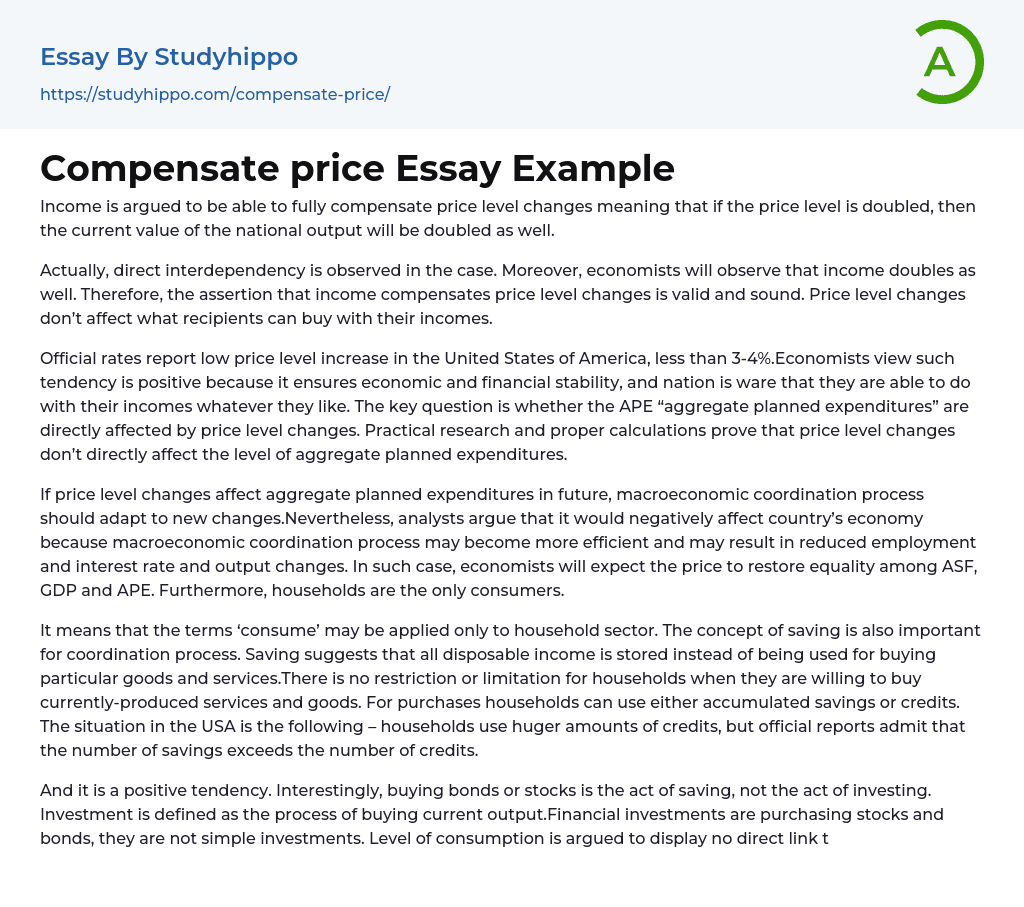It is believed that changes in the price level can be completely compensated by income. Therefore, if the price level doubles, the current value of national output will also double.
In fact, the case reveals a direct interdependence that economists predict will lead to income doubling. Thus, it can be inferred that the assertion linking income with changes in price levels is both reliable and valid, indicating that alterations in price levels will not affect the purchasing power of those earning an income.
The official rates in the USA show a slight rise in the price level, below 3-4%, which is viewed positively by economists as it fosters economic and financial stability and offers individuals the liberty to spend their earnings as they choose. Nevertheless, it's vital to establish whether changes in the price level impact aggregate planned expenditures (APE).
...Research indicates that precise calculations reveal no effect of alterations in the price level on APE.
In the event that changes in price levels impact future aggregate planned expenditures, it is imperative for the macroeconomic coordination process to adjust accordingly. However, experts contend that this could have a negative impact on a country's economy as the process may become more efficient and lead to reductions in employment, interest rates, and output changes. In this scenario, economists predict a restoration of balance between the ASF, GDP, and APE prices. Additionally, households are the sole consumers in this context.
It is indicated that the use of the term ‘consume’ is only applicable to the household sector, and the idea of savings plays a crucial role in the coordination process. The act of saving implies that any disposable income i
reserved rather than spent on specific goods and services. Households have no limitations or restrictions when purchasing goods and services currently available. Accumulated savings or credits can be used for these purchases. In the United States, households tend to use significant amounts of credits, although official reports acknowledge that the amount of savings surpasses the number of credits.
It is noteworthy that buying bonds or stocks is actually a form of saving rather than investing, although this is a beneficial trend. The act of investment denotes the procurement of current output, which financial investments such as purchasing stocks and bonds do not necessarily fall under. While it is argued that changes in the interest rate do not have a direct impact on the level of consumption, it is also believed that the household sector is not directly influenced by fluctuations in interest rates.
Modest and slow fluctuations in interest rates can trigger sharp economic responses. The household sector, which is the only saving and consuming sector, depends on interest rates as they use credits for purchasing goods and services. If interest rates increase, households tend to save more while if they decrease, households tend to rely more on credits. Any changes in the interest rate level can directly affect the prosperity of households that use credits for consumption.
According to Ashby, the use of credit by households tends to lead to a decrease in consumption. In terms of economic development, investments play a crucial role by increasing average inventories and replacing outdated equipment. Business saving contributes to higher levels of investment, whereas increased interest rates result in reduced investment. Ashby emphasizes the government's pivotal role in a country's
development and economic policy.
Presently, the government procures capital goods for purposes such as defense, fire and policy protection and education. In comparison, the foreign trade sector in the USA is small. Exports and imports are influenced by exchange rates, and are vulnerable to trade barriers like exchange controls, quotas and tariffs. Furthermore, fluctuations in price levels can have an undesirable impact on both interest rate fluctuations and overall intended expenditures.
- Accounting essays
- Marketing essays
- Automation essays
- Business Cycle essays
- Business Model essays
- Business Operations essays
- Business Software essays
- Corporate Social Responsibility essays
- Infrastructure essays
- Logistics essays
- Manufacturing essays
- Multinational Corporation essays
- Richard Branson essays
- Small Business essays
- Cooperative essays
- Family Business essays
- Human Resource Management essays
- Sales essays
- Market essays
- Online Shopping essays
- Selling essays
- Strategy essays
- Management essays
- Franchising essays
- Quality Assurance essays
- Business Intelligence essays
- Corporation essays
- Stock essays
- Shopping Mall essays
- Harvard Business School essays
- Harvard university essays
- Trade Union essays
- Cooperation essays
- News Media essays
- Waste essays
- Andrew Carnegie essays
- Inventory essays
- Customer Relationship Management essays
- Structure essays
- Starting a Business essays
- Accounts Receivable essays
- Auditor's Report essays
- Balance Sheet essays
- Costs essays
- Financial Audit essays
- International Financial Reporting Standards essays
- Tax essays
- Accountability essays
- Cash essays
- Principal essays




